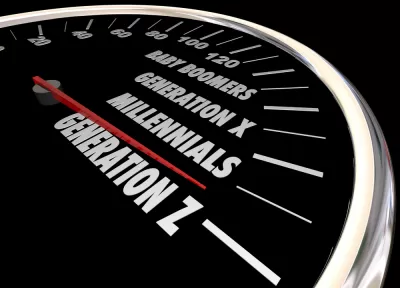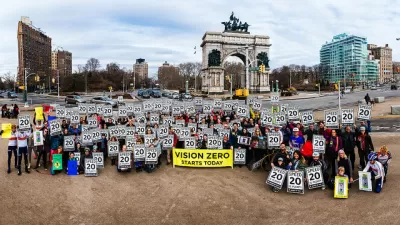Think Generation Z will usher in the long-awaited post-car future of transit advocates’ dreams? Think again (about the example set by the Millennials).

Generation Z is driving less than their predecessors, according to several recent reports. Only 25 percent of U.S. 16-year-olds earned driver’s licenses in 2020—down from 40 percent in 1997, according to data from the Federal Highway Administration data analyzed by Green Car Congress and cited in an article by Taylor Penley in February. Additional articles by The Economist and the Washington Post picked up on the theme during the same week.
David Zipper, writing for Bloomberg CityLab, wants everyone to pause before starting to plan for a future defined by Zoomers without cars:
Despite the fond hopes of many urban planners and mobility advocates (as well as some journalists), generational preferences are no match for decades of autocentric development that all but force most US residents to drive, even if they would prefer not to.
Zipper cites a recent example for clues to how this story will unfold. Those with a memory back to the Great Recession will remember the narrative about “peak car” that was popular a decade ago, as Millennials flocked to cities and embraced biking and transit. Millennials grew up, and subsequently moved to more suburban locations in search of more space for hybrid work schedules and growing families. As described by Zipper, the “peak car” narrative was a temporary mirage, created by the general lack of affordability—a problem that still exists for the next generation today.
If the next generation won’t reverse the direction of car culture, what will? Zipper provides his answer:
If we want to untether society from its reliance on automobiles, we cannot avoid the difficult work of building places that don’t need them. That requires increasing density and investing in transit and bike lanes — which lets people have real choices about how they travel. Generational shifts might provide a tailwind, but without major policy reforms, today’s car-wary teens will become tomorrow’s daily drivers.
Since it will take a lot of work to overcome the effects of decades of car-centric planning in the United States, I would suggest one more prescription for the list: building more housing and amenities the suit the needs of families in urban areas. I’m not talking about single-family residential; I mean multi-family buildings with space for multiple generations, access to jobs, and proximity to high-quality, frequent transit. In fact, family-friendly neighborhoods might be as critical, if not more critical, to the long-term viability of car-free lifestyles as any of the other popular buzzwords, like the 15-Minute City or Walkable Urban Places.
FULL STORY: Gen Z’s Turn Against Driving Is a Mirage

Planetizen Federal Action Tracker
A weekly monitor of how Trump’s orders and actions are impacting planners and planning in America.

Congressman Proposes Bill to Rename DC Metro “Trump Train”
The Make Autorail Great Again Act would withhold federal funding to the system until the Washington Metropolitan Area Transit Authority (WMATA), rebrands as the Washington Metropolitan Authority for Greater Access (WMAGA).

DARTSpace Platform Streamlines Dallas TOD Application Process
The Dallas transit agency hopes a shorter permitting timeline will boost transit-oriented development around rail stations.

Renters Now Outnumber Homeowners in Over 200 US Suburbs
High housing costs in city centers and the new-found flexibility offered by remote work are pushing more renters to suburban areas.

The Tiny, Adorable $7,000 Car Turning Japan Onto EVs
The single seat Mibot charges from a regular plug as quickly as an iPad, and is about half the price of an average EV.

Supreme Court Ruling in Pipeline Case Guts Federal Environmental Law
The decision limits the scope of a federal law that mandates extensive environmental impact reviews of energy, infrastructure, and transportation projects.
Urban Design for Planners 1: Software Tools
This six-course series explores essential urban design concepts using open source software and equips planners with the tools they need to participate fully in the urban design process.
Planning for Universal Design
Learn the tools for implementing Universal Design in planning regulations.
Municipality of Princeton
Roanoke Valley-Alleghany Regional Commission
City of Mt Shasta
City of Camden Redevelopment Agency
City of Astoria
Transportation Research & Education Center (TREC) at Portland State University
US High Speed Rail Association
City of Camden Redevelopment Agency
Municipality of Princeton (NJ)





























